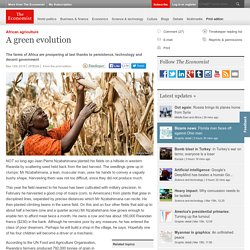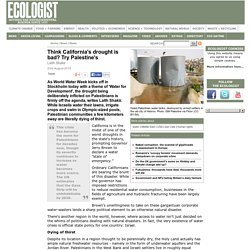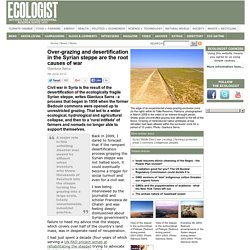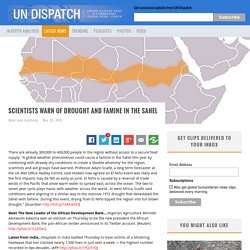

Ban on selfies with lambs in Pentland Hills in Edinburgh. Facebook. Explicit cookie consent. NOT so long ago Jean Pierre Nzabahimana planted his fields on a hillside in western Rwanda by scattering seed held back from the last harvest.

The seedlings grew up in clumps: Mr Nzabahimana, a lean, muscular man, uses his hands to convey a vaguely bushy shape. Harvesting them was not too difficult, since they did not produce much. This year the field nearest to his house has been cultivated with military precision. In February he harvested a good crop of maize (corn, to Americans) from plants that grew in disciplined lines, separated by precise distances which Mr Nzabahimana can recite. He then planted climbing beans in the same field. According to the UN Food and Agriculture Organisation, Rwanda’s farmers produced 792,000 tonnes of grain in 2014—more than three times as much as in 2000.
Rwanda is exceptional. Millions of African farmers like Mr Nzabahimana have become more secure and better-fed as a result of better-managed, better-fertilised crops grown from hybrid seeds. Does Ethiopia need international aid to cope with drought? Think California's drought is bad? Try Palestine's. This crisis has become the norm for Palestinians for decades now, though its severity continues to increase as water becomes more scarce.

The UN estimates that the Gaza Strip will be uninhabitable by 2020. California is in the midst of one of the worst droughts in the state's history, prompting Governor Jerry Brown to declare a water "state of emergency. " Ordinary Californians are bearing the brunt of this disaster. While the governor has imposed restrictions to reduce residential water consumption, businesses in the fields of agriculture and hydraulic fracturing have been largely exempt.
Brown's unwillingness to take on these gargantuan corporate water-wasters lends a sharp political element to an otherwise natural disaster. There's another region in the world, however, where access to water isn't just decided on the whims of politicians dealing with natural disasters. Dying of thirst Israeli water policy, however, has made this prospect virtually impossible. Weaponizing water. Solar Cooking is Sustainable and Fun. If you’ve ever been stuck in a black car on a hot day, then you understand the concept of solar cooking, says Louise Meyer, founder of Solar Household Energy, Inc.

(SHE), which promotes solar cooking all over the world. Simply put, a dark surface absorbs sunlight and turns those light waves into heat energy. That’s why your car’s dark leather seats burn up in the summertime, and why we can rely on the sun for fuel. “It’s a heat trap,” Meyer explains. Meyer became interested in harnessing the sun for fuel when she lived in the Sahel in Northern Africa in the early 1990s. When they were unable to carry enough wood on their heads, they would pull their daughters out of school and enlist them in the often dangerous task. Meyer had her eureka moment while writing her final report.
Meyer chats with me in the National Geographic courtyard, flanked by environmentalist Janet Murphy on one side and Nat Geo’s farmers’ market on the other. “And, it’s fun!” Meyer believes the trend is catching on. Over-grazing and desertification in the Syrian steppe are the root causes of war. A major role in this unfolding disaster was played by affluent urban investors who threw thousands of livestock into the steppe turning the grazing into a large-scale, totally unsustainable, industrial practice.

Back in 2009, I dared to forecast that if the rampant desertification process gripping the Syrian steppe was not halted soon, it could eventually become a trigger for social turmoil and even for a civil war. I was being interviewed by the journalist and scholar Francesca de Chatel- and was feeling deeply disillusioned about Syrian government's failure to heed my advice that the steppe, which covers over half of the country's land mass, was in desperate need of recuperation. I had just spent a decade (four years of which serving a UN-FAO project aimed at rehabilitating the steppe) trying to advocate that livestock over-grazing of the steppe rangelands was the key cause of its ecological degradation. Scientists Warn of Drought and Famine in the Sahel.
There are already 300,000 to 400,000 people in the region without access to a secure food supply.

“A global weather phenomenon could cause a famine in the Sahel this year by combining with already dry conditions to create a ‘double whammy’ for the region, scientists and aid groups have warned. Professor Adam Scaife, a long term forecaster at the UK Met Office Hadley Centre, said models now agreed an El Niño event was likely and the first impacts may be felt as early as June. El Niño is caused by a reversal of trade winds in the Pacific that allow warm water to spread east, across the ocean. The two to seven year cycle plays havoc with weather across the world…In west Africa, Scaife said conditions were aligning in a similar way to the massive 1972 drought that devastated the Sahel with famine. During this event, drying from El Niño tipped the region into full blown drought.” Africa BREAKING: There are reports of massive car bomb attacks in Baghdad, including at the Sheraton Hotel.
Asia.